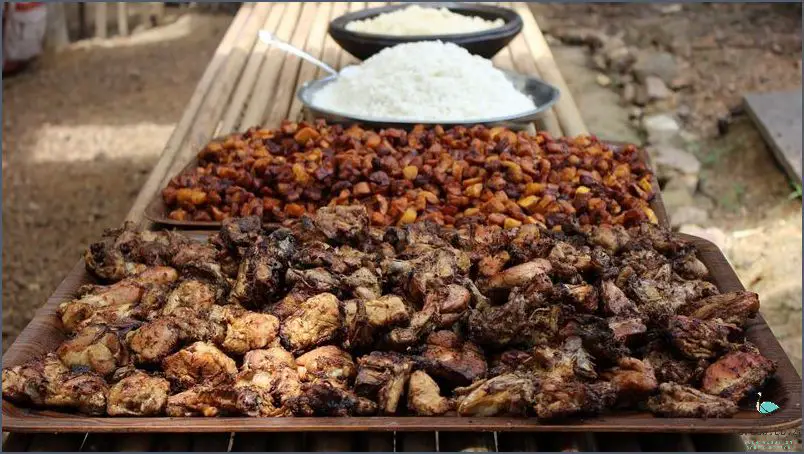
The Tswana, a Bantu ethnic group, originated from Southern Africa. They speak Setswana, a language that is part of the Sotho-Tswana group. In Botswana, Tswana are the predominant ethnic group, comprising approximately 79% of the population. They also inhabit regions of South Africa, Zimbabwe, and Namibia.
The Tswana culture boasts richness and uniqueness, encapsulating a series of fascinating traditions and facts. They hold strong beliefs in the supernatural and often engage traditional healers in the treatment of illness and injury. With music and dance deeply woven into the fabric of their culture, traditional Tswana rhythms stand distinctively apart from the Western music typically heard today.
Renowned for their diligence and tenacity, the Tswana people foster a potent sense of community. Family bonds hold significant importance in their society, with a special emphasis on venerating the elders.
For those curious to delve deeper into Tswana culture, myriad resources await online and in libraries. Many tour operators also cater to this interest.
Table of Contents
Interesting Facts About Tswana Culture
The Tswana culture is an ancient culture from the region of Southern Africa. It is believed to have originated from the Bantu ethnic group. Tswana culture is known for its vibrant colors and fabrics, as well as its unique language. One interesting fact about Tswana culture is that the traditional language is a tonal language, which means that the same word can have different meanings depending on how it is pronounced. Another fascinating fact about Tswana culture is that the traditional clothing worn by Tswana people is heavily influenced by the colors of nature, with colors like green, blue, yellow, and brown being commonly used. Additionally, the traditional dance of Tswana culture is a lively dance with lots of jumping and hand clapping. Finally, Tswana culture has a strong emphasis on respect for one’s elders and ancestors, which is demonstrated through the practice of ancestor worship.
- Language: The Tswana language, also called Setswana, is a Bantu language. It’s the official language of Botswana and is also widely spoken in South Africa.
- Beliefs: The Tswana people are traditionally monotheistic, and believe in a supreme being known as Modimo. Ancestors play a significant role in Tswana belief systems, and they’re regarded as intermediaries between the living and Modimo.
- Art: Traditional Tswana art is often in the form of pottery, weaving, and house decoration. They’re known for their skill in crafting beautiful and intricate beadwork.
- Music and Dance: Music and dance are significant aspects of Tswana culture. Traditional music often involves instruments such as the stringed “segaba” and the “setinkane,” a type of thumb piano. Dance forms like the “Borankana,” “Phathisi,” and “Setapa” are integral parts of social gatherings and celebrations.
- Oral Tradition: Like many African cultures, Tswana people have a rich oral tradition. Storytelling is highly valued and often involves folk tales that teach moral lessons.
- Traditional Attire: The traditional attire of the Tswana people is beautifully vibrant. Women typically wear beautifully patterned dresses called “khiba” and “mosese”, while men wear a loincloth known as “tshega”.
- Marriage Customs: Traditionally, lobola (bride price) is paid by the groom’s family in the form of cattle. A negotiation process takes place between the two families to decide on the number of cattle.
- Circumcision Rites: Both males and females traditionally go through a circumcision and initiation rite known as “bogwera” for men and “bojale” for women. This rite signifies their transition into adulthood.
- Cuisine: Tswana cuisine often features sorghum and maize as staple foods. Dishes include “seswaa,” a slow-cooked, pulled beef, and “bogobe jwa logala,” a porridge made with sour milk and cornmeal.
- Respect: Respect, especially towards elders, is a critical aspect of Tswana culture. It’s often shown through language, body language, and adherence to traditional norms and customs.
Each of these aspects contributes to the vibrant and rich Tswana culture, which is celebrated by Tswana people across Southern Africa.
Traditional clothing of Tswana people
Tswana people are a Bantu-speaking people that inhabit the southern parts of Africa. They have a rich culture and heritage that has been passed down through generations, including traditional clothing. The traditional clothing of the Tswana people has been an important part of their culture and is still worn today by many Tswana people.

The most common type of traditional clothing for the Tswana people is called the Shweshwe. It is a type of cotton fabric that is usually decorated with colorful patterns, often of geometric shapes. It is usually worn as a dress or a skirt and is typically paired with a matching headband. It is believed to be derived from the Dutch settlers in South Africa during the 18th century.
Another type of traditional clothing for the Tswana people is the Kgofa. This is a type of woolen cloth that is usually decorated with traditional beadwork. It is usually worn as a skirt or a dress and is often paired with a matching headband. It is believed to be derived from the traditional Sotho people of the area.
The last type of traditional clothing for the Tswana people is the Letshwao. This is a type of leather clothing that is usually decorated with traditional beadwork. It is usually worn as a skirt or a dress and is often paired with a matching headband. It is believed to be derived from the traditional Sotho people of the area.
The traditional clothing of the Tswana people is an important part of their culture and heritage. It is a symbol of their identity and is a way for them to express themselves and their beliefs. It is also a way for them to connect to their ancestors and their cultural past. The traditional clothing of the Tswana people is a beautiful and unique part of their culture that is still worn by many today.
Traditional cuisine of Tswana people
The Tswana people are a fascinating cultural group with a rich history that has been passed down through generations. From their traditional cuisine to their fascinating folklore, there is much to learn about this amazing culture. Here are some interesting facts about Tswana culture and their traditional cuisine.
The Tswana people are known for their hearty and flavorful cuisine, which has been passed down from generation to generation. Traditional dishes include seswaa, a type of stew that is cooked for hours in a pot over an open fire, and bogobe, a type of porridge made from maize. Meat such as beef, chicken, goats, and game are also popular in Tswana cuisine.
The Tswana people have a unique way of preparing their meals that adds to the flavor of the food. They often use a special type of clay pot called a ‘mokoro’ to cook their dishes, as this helps to retain the flavors of the ingredients. The clay pot is also said to impart a distinct flavor to the food.
Tswana people are passionate about their food and take great pride in their cuisine. They often gather together to socialize, with food being the center of the gathering. The traditional way of eating is to sit around a large pot, with everyone taking a portion of the food from the pot.

The traditional cuisine of the Tswana people is an important part of their culture, and it has been passed down from generation to generation. With its unique flavors and cooking techniques, it is no wonder why the Tswana people have been able to preserve their traditional cuisine for centuries.
Tswana customs and ceremonies
Tswana culture is a fascinating and deeply rooted tradition that has been passed down through generations of people in Southern Africa. From language to music and ceremonies, the Tswana people have developed an incredibly unique culture that still remains vibrant to this day. From the age-old traditions of the Tswana to their modern-day customs and ceremonies, there are plenty of interesting facts about Tswana culture that will fascinate you.
First and foremost, the Tswana language is the official language of Botswana and one of the main languages spoken in South Africa. It is a language that is deeply rooted in the culture, with many words and phrases that have been handed down from one generation to the next. Music is also a big part of the culture, with many traditional songs and dances often performed during ceremonies.
When it comes to customs and ceremonies, the Tswana people have a number of unique and meaningful traditions. One of the most important ceremonies is known as the ‘Seleka’, which is a traditional wedding ceremony. During this ceremony the bride and groom exchange gifts and recite vows of commitment to each other. This ceremony is often followed by a feast and plenty of dancing.
Other important ceremonies include the ‘Lobola’, which is a ceremony where a man will pay the bride’s family for permission to marry her. This is often done in the form of livestock or other goods, and is a way for the family to ensure that their daughter is well taken care of. The ‘Umtshina’ ceremony is another important tradition, where a man will be initiated into adulthood by his brother or uncle.
The Tswana people also have a number of unique beliefs and superstitions that they still hold to this day. For example, they believe that witches are responsible for bad luck, and they perform rituals to protect themselves from them. They also believe that certain animals bring luck, such as the owl, and they will often keep them in their homes.
These are just a few of the many interesting facts about Tswana culture. From their language to their customs and ceremonies, the Tswana people have developed a culture that is rich in history and deeply rooted in tradition. It is a culture that is still alive and thriving today, and one that is sure to fascinate you.
Conclusion
Overall, the Tswana culture is full of fascinating aspects that make it unique and interesting. From the traditional attire and customs to the various aspects of day-to-day life, the Tswana people have a strong connection to their past and continue to preserve their traditions. From their language and beliefs to the foods that they eat, the Tswana culture is full of interesting facts that make it stand out from other cultures. With its deep-rooted history and traditions, the Tswana culture is sure to be respected and appreciated for many years to come.




